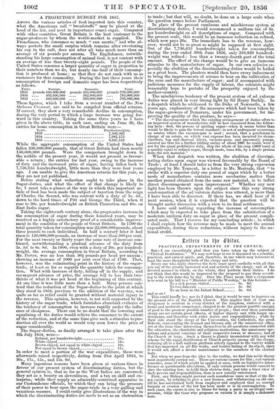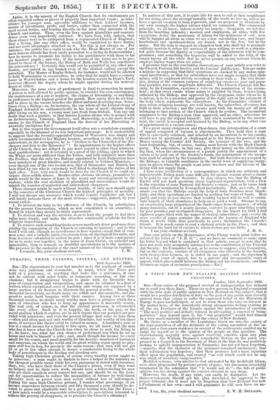It Errs tli t4t e/titur.
PRACTICAL IMPROVEMENTS IN THE CHURCH.
Sue—I am exceedingly glad that you have taken up the subject of "Clerical Destitution." We may now hope to see it discussed in a sensible, practical, and earnest spirit, and, therefore, in one which may influence at least the more thoughtful both of the clergy and laity.
Every one who fairly observes the facts must agree cordially with all that you say of the greatly increased zeal and activity of the clergy, and of the devoted manner in which, on the whole, they perform their duties. I do not think that this would be improved by the proposal to pay them accord- ing to the work done day by day. Does the Times mean that a clergyman is to send in his bill to a "Minister of Public Worship," in this fashion— To a sick person visited 6s. 8d. To two funerals 5s. Od.
To an hour in the Infant School 3s. 6d.
and so on ?
This could hardly be ; nor do I think that it would be easy to improve on the present idea of the English Church. This implies that at least one clergyman is resident in every district of the kingdom, endowed with a house and moderate competence, charged to do the greatest possible amount of good to the greatest possible number of people; over these parochial clergy are set certain great officers, of higher dinity and with larger en- dowments, and therefore with wider duties and responsibilities; while by their side stand the clergy of the Universities, the Cathedrals, the great Schools, representing the learned and literary side of the ministerial office, yet at the same time interesting themselves in all questions connected with the education, the charitable and religious institutions, the missionary ope- rations and general concerns of their respective towns or dioceses, and of the Church at large. Such a theory is plainly inconsistent with any wild scheme for the equal distribution of Church property among all the clergy, reducing all to a dull uniform platform utterly opposed to the variety which God has impressed on all His works, and besides failing of its object, since it would not afford a decent maintenance to the members of the clerical body. But when we pass from the idea: to the reality, we find this noble theory most imperfectly carried out. There are various causes for this ; and various remedies, some of which might be applied at once, with no legislative inter- ference or questionable alterations, if only certain persons would consent to obey the existing law, to fulfil their obvious duty, and take a truer view of their powers and responsibilities, than is now usually entertained.
First, any Bishop might prevent such scandalous eases as that of the Es- sex curate, by refusing to give a new licence, and withdrawing an old one, till he has ascertained both from employer and employed that no corrupt bargain or evasion of the law has been madeor is in contemplation.
such cases, the curate is also to blame for being a party to an illegal com- promise, while the vicar who proposes or extorts it is simply a dishonest Again, it is the misery of the English Church that its emoluments are often regarded rather as pieces of property than important trusts ; as inhe- ritance for younger sons, agreeable additions to their holders' incomes, means of investment, profit, and barter, rather than connected with the most sacred duties, and bearing directly on the most vital interests of the Church and nation. Thus, even the laws against pluralities and nonresi- dence seem very imperfectly enforced. We have been told, indeed, that these abuses were to be extirpated from a regenerated Church of England ; that a living, like any other office, would be considered to have duties, and not mere advantages attached to it. Yet this is not always so. For instance, the public has a right to ask why the Head Master of one of our most famous schools has been lately presented to a living in Somerseethire ; how he means to reconcile his duties to his parishioners with those to his six hundred pupils ; and why, if the interests of the latter are to be pre- ferred to those of the former, the Bishop of Bath and Wells has sanctioned his nonresidence ? Certainly this would not be permitted in any other pro- fession, nor indeed in any branch even of the clerical calling except the parochial. The Master of Rugby School, for instance, would not be allowed to hold Westminster in eamtrum, in order that he might have a country home in Warwickshire and a house for the London season in Dean's Yard, however efficient the deputy whom he might_ appoint during his nonresi- dence at either.
Moreover, the same view of preferment is fatal to promotion by merit. A patron is still allowed by public opinion, to consider his own convenience, the maintenance of a son or nephew, the claims of friendship, or anything, in 'preference to the highest good of the parish. How rarely does he set him- self to place in the vacant benefice the fittest and most deserving man. Some- times even a Bishop—as, for instance, the one whom all the Liberal clergy of England defended so enthusiastically in his hour of need—thrusts living after living on his son, a young man just fresh from Oxford. Can any one doubt that such a prelate, or that famous London divine who is gorged with an Archdeaconry, Canonry, Rectory, and Mastership, is a far more deadly enemy to the Church of England than the fiercest of her Dissenting or avowedly irreligious foes ? But in this respect the Government itself often sets a scandalous example, especially in the disposal of its less important patronage. Is it uncharitable to suppose that the recently-appointed Canon of Worcester was simply and solely recommended to her Majesty because, according to the sketch of his antecedents in the newspapers, he is "brother to the Chancellor of the Ex- chequer and heir to the Baronetcy" ? In appointments to the higher offices of the Church, they are obliged to pay more regard to other than aristocra- tical qualifications : yet it certainly is a proof of the jobbing spirit to which the Whigs are more addicted than the Tories, and both infinitely more than the Peehtes, that the only two Bishops appointed by Lord Palmerston have been members of great families, and nearly related to Cabinet Ministers,— even though one of the two vacant sees, that of Gloucester and Bristol, has been filled by one who is extremely well fitted to discharge the duties of his high office. Now, very much would be done for the Church if we could ex- tirpate these selfish abuses. Besides other obvious blessings, promotion by merit would be the source of hope to the weary and encouragement to the zealous, while the real abolition of pluralities and nonresidence would di- minish the number of neglected and unbeneficed clergymen. These changes might be made without trouble, if only men should apply to the concerns of the Christian Church the highest principles of morality. I will not discuss any measures which would require legislative aid, but I will briefly indicate three of the most obvious,—suggested, indeed, by your recent article.
I. To interest the laity in the efficiency of the Church, by substituting for the present Convocation, which as now constituted is an absurdity, a Synod in which they should be fairly represented. 2. To shorten and vary the services, so as to lead the people to feel their value more deeply, and make the churches continually available for their religious improvement. 3. To remove such stumblingblocks as now needlessly deter good men from
hjoining the communion of the Church or entering its ministry : and to this ead I will add, (though no interference is here wanted except that of com- mon sense and a catholic spirit,) to abstain from all theological lawsuits, and from decisions calculated to narrow its pale ; since it is of more consequence for us to make war together, in the name of Jesus Christ, on unbelief and immorality, than to wrangle on doubtful speculations as to the manner of His presence in the eucharist or the exact nature of the change in baptism.
I remain, Sir, your obedient servant, C. M.



























 Previous page
Previous page